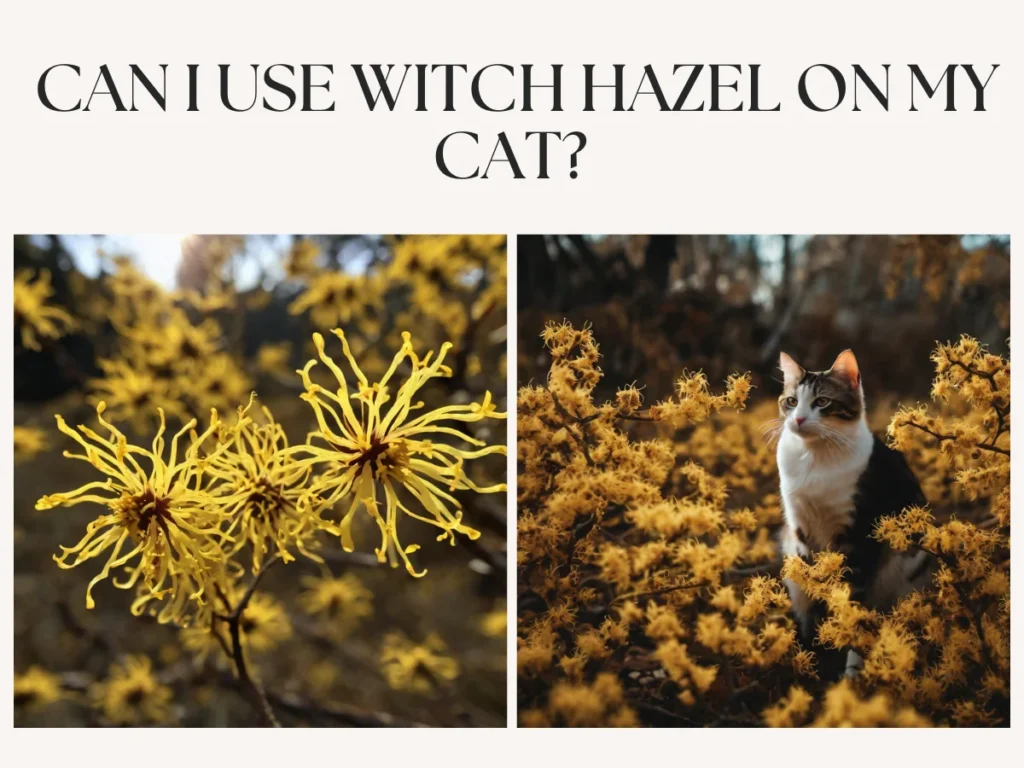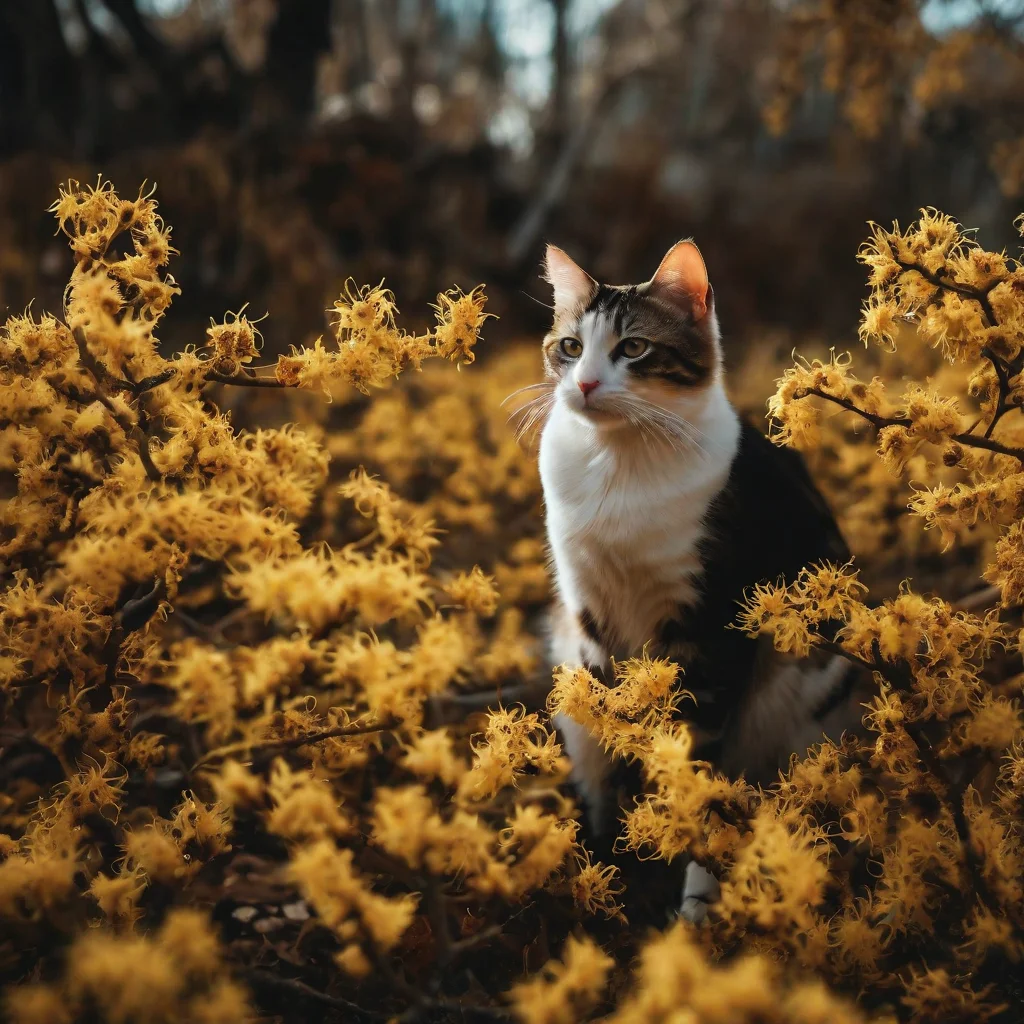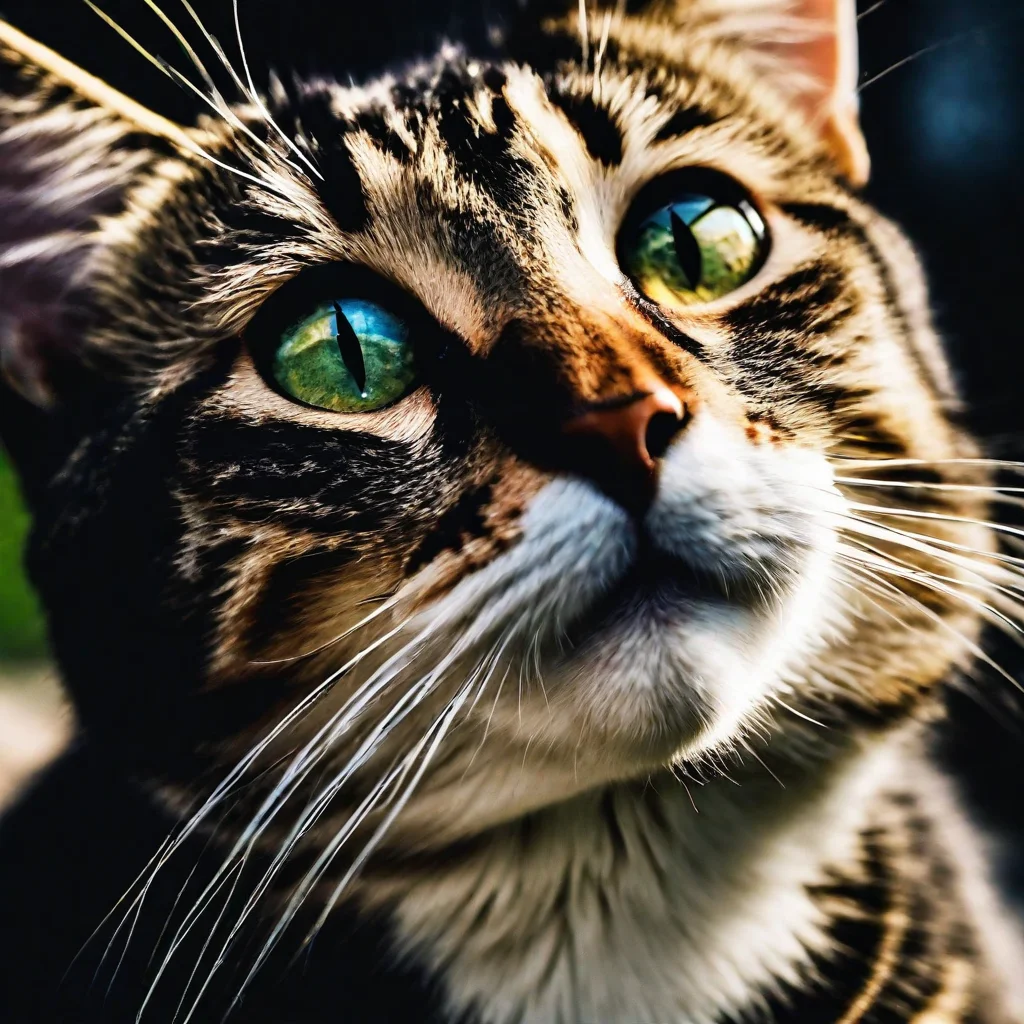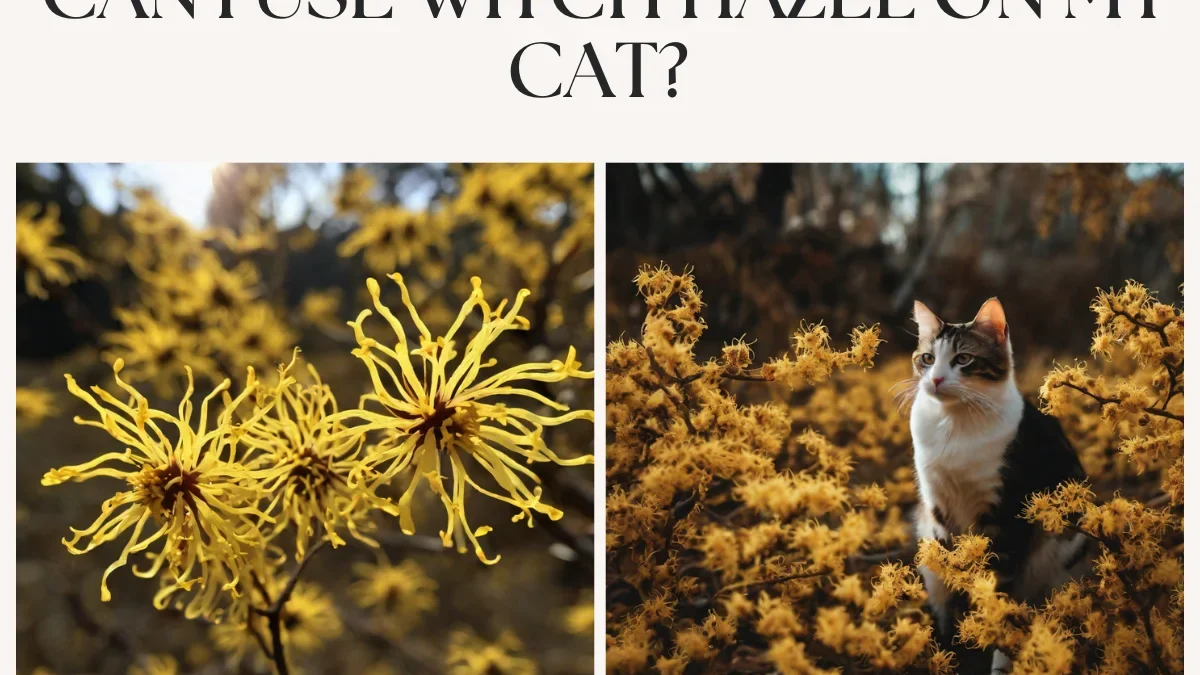Is Witch Hazel Safe for Cats? As pet owners, we want nothing but the best for our furry friends. When it comes to their health and well-being, we are always on the lookout for safe and effective remedies. However, with so many products and natural remedies available, it can be overwhelming to determine which ones are safe for our cats. One popular natural remedy that has gained attention in recent years is witch hazel. But the question remains, is witch hazel safe for cats? In this blog post, we will take a closer look at this natural remedy and provide a helpful guide for cat owners
Table of Contents

Understanding Witch Hazel and its Common Uses
Witch hazel is a popular natural remedy that has been used for centuries due to its numerous benefits. This plant, scientifically known as Hamamelis virginiana, is native to North America and has been recognized for its healing properties. While witch hazel is commonly used in human skincare and first aid products, its uses for cats are less well-known.
One of the main uses of witch hazel is as an astringent. It is known for its ability to constrict blood vessels and reduce inflammation, making it an effective remedy for a variety of skin conditions. For humans, witch hazel is often used to soothe sunburns, heal wounds, and treat acne. But can the same benefits be applied to our feline companions?
In cats, witch hazel can also be used as a mild antiseptic and disinfectant. It can help cleanse and soothe minor wounds or skin irritations. If your cat has a small scratch or insect bite, applying witch hazel with a clean cloth or cotton ball can help promote healing and provide relief from itching. It can also be used to gently clean your cat’s ears or wipe away dirt and debris from their fur.
Additionally, witch hazel can be used as a natural remedy for certain skin conditions in cats. For example, if your cat has hot spots, which are areas of irritated and inflamed skin, applying a small amount of witch hazel can help alleviate the discomfort. It can also be beneficial for cats with allergies or dermatitis, as it can help reduce itching and inflammation.
However, it is important to note that while witch hazel is generally safe for cats when used topically, it should not be ingested. Cats may be tempted to lick the area where witch hazel has been applied, and ingestion can lead to digestive upset or other health issues. Therefore, it is crucial to ensure that your cat cannot access any areas where witch hazel has been used.
In the next section, we will delve deeper into the impact of witch hazel on pets and explore whether it is safe to use on cats. Stay tuned to find out more about the potential risks and benefits of this natural remedy for our feline friends.
The Impact of Witch Hazel on Pets

Witch hazel, a popular natural remedy known for its healing properties, has gained attention in recent years for its potential benefits for both humans and animals. But what impact does witch hazel have on our furry feline friends? Let’s delve into the topic and explore whether it is safe to use witch hazel on cats.
When it comes to cats and witch hazel, it’s important to proceed with caution. While witch hazel can be used topically on cats to help cleanse minor wounds, soothe skin irritations, and alleviate itching, there are certain considerations to keep in mind. Cats have unique physiological differences compared to humans and other animals, which means they may react differently to certain substances.
One of the main concerns with using witch hazel on cats is the potential for ingestion. Cats are notorious for their grooming habits and may be tempted to lick or ingest the witch hazel if applied to their skin. Ingestion of witch hazel can lead to digestive upset or other health issues. Therefore, it is crucial to prevent your cat from accessing any areas where witch hazel has been applied.
Additionally, some cats may have an adverse reaction to witch hazel. While it is generally safe for topical use, individual sensitivities can vary. It’s essential to closely monitor your cat’s response to witch hazel and discontinue use if you notice any signs of discomfort or irritation. If you are unsure about using witch hazel on your cat or if your cat has an existing health condition, it is always best to consult with your veterinarian before using any new product or remedy.
It’s also worth mentioning that there are alternatives to witch hazel for cat care. If you’re looking for natural remedies to soothe your cat’s skin or alleviate itching, coconut oil and aloe vera are often safe options. However, just like with witch hazel, it’s crucial to do your research and consult with your vet before introducing any new products to your cat’s skincare routine.
Can You Safely Use Witch Hazel on Cats?

When it comes to using witch hazel on cats, it’s important to proceed with caution. While witch hazel can be a beneficial natural remedy for cats when used topically, there are some considerations to keep in mind.
First and foremost, the main concern when using witch hazel on cats is the potential for ingestion. Cats are notorious groomers, and if they come into contact with witch hazel on their fur or skin, they may be tempted to lick it off. Ingesting witch hazel can lead to digestive upset or other health issues, so it’s crucial to prevent your cat from accessing any areas where witch hazel has been applied. This can be achieved by applying the witch hazel to a cloth or cotton ball and gently dabbing it onto the affected area, rather than directly spraying or pouring it onto your cat.
Additionally, while witch hazel is generally safe for topical use on cats, some individual cats may have sensitivities or allergic reactions to it. It’s essential to closely monitor your cat’s response to witch hazel and discontinue use if you notice any signs of discomfort or irritation. It’s always best to start with a small patch test before applying witch hazel to a larger area of your cat’s skin.
If you’re unsure about using witch hazel on your cat or if your cat has an existing health condition, it’s always recommended to consult with your veterinarian before introducing any new product or remedy. They can provide guidance and advice specific to your cat’s needs and help determine if witch hazel is a suitable option for your furry friend.
Possible Side Effects of Witch Hazel on Cats
While witch hazel can be a helpful natural remedy for cats, it’s important to be aware of the possible side effects. Though relatively rare, some cats may experience adverse reactions to witch hazel. It’s crucial to closely monitor your cat’s response and discontinue use if you notice any signs of discomfort or irritation.
One potential side effect of using witch hazel on cats is skin dryness or irritation. Some cats may have sensitive skin that reacts poorly to the astringent properties of witch hazel. This can manifest as redness, itching, or flakiness. If you notice any of these symptoms, it’s best to stop using witch hazel and consult with your veterinarian for alternative remedies or treatments.
Another possible side effect is allergic reactions. Just like humans, cats can be allergic to certain substances, including witch hazel. Allergic reactions can range from mild itching and sneezing to more severe symptoms such as difficulty breathing or swelling. If you suspect your cat is having an allergic reaction to witch hazel, seek veterinary care immediately.
Additionally, ingestion of witch hazel can cause digestive upset in cats. As mentioned earlier, cats are prone to grooming themselves and may lick off any witch hazel applied to their fur or skin. Ingesting witch hazel can lead to stomach discomfort, vomiting, or diarrhea. To prevent ingestion, ensure your cat cannot access any areas where witch hazel has been applied.
It’s important to remember that each cat is unique and may react differently to witch hazel. What works well for one cat may not work for another. Always closely observe your cat’s behavior and physical condition when using any new product or remedy.
If you notice any concerning side effects or have any doubts about using witch hazel on your cat, it’s best to consult with your veterinarian. They can provide expert guidance tailored to your cat’s individual needs and help you determine the safest and most effective course of action.

Alternatives to Witch Hazel for Cat Care
If you’re hesitant to use witch hazel on your cat or if you’ve noticed that your furry friend has a negative reaction to it, don’t worry! There are alternative options that you can consider for your cat’s skincare needs. While witch hazel is a popular natural remedy, it’s not the only solution out there.
Coconut oil is one alternative that you can try. It has numerous benefits for cats and can be used to soothe irritated skin, moisturize dry patches, and even promote a healthy, shiny coat. Plus, most cats love the taste of coconut oil, making it easy to apply topically or mix into their food.
Aloe vera is another excellent option. Known for its cooling and soothing properties, aloe vera can provide relief to cats with itchy skin, sunburns, or minor cuts and scratches. It’s important to note that you should only use pure, organic aloe vera gel or juice, as some commercial products may contain additives or chemicals that can be harmful to cats.
If you’re looking for a more specialized alternative, chamomile tea can be used to alleviate itchiness and inflammation in cats. Brew a strong cup of chamomile tea, let it cool, and then use a cotton ball or cloth to apply it to the affected area. Chamomile has calming properties and can help soothe irritated skin.
Oatmeal baths can also be beneficial for cats with sensitive or itchy skin. You can find oatmeal-based shampoos specifically designed for pets, or you can make your own by grinding plain, unflavored oatmeal into a fine powder and adding it to warm water. Soak your cat in the oatmeal bath for a few minutes to allow the soothing properties to take effect.
Remember, it’s essential to consult with your veterinarian before trying any new products or remedies on your cat. They can provide guidance specific to your cat’s needs and help you determine the best course of action. While witch hazel can be a helpful natural remedy, there are alternatives out there that may be more suitable for your feline companion.
In the next section, we’ll discuss when it’s necessary to consult with your vet and the importance of seeking professional advice when it comes to your cat’s health and well-being. Stay tuned!
Consultation with the Vet: When is it Necessary?
Caring for our beloved feline friends can sometimes feel like navigating a maze. With so many products and natural remedies available, it can be challenging to determine which ones are safe and effective for cats. When it comes to using witch hazel on cats, it’s crucial to proceed with caution. While witch hazel can be a helpful natural remedy for cats, there are certain situations when it’s necessary to consult with your vet.
One key factor to consider is the overall health and well-being of your cat. If your cat has an existing health condition or is currently taking medication, it’s essential to seek professional advice before introducing any new products or remedies, including witch hazel. Your vet will have a comprehensive understanding of your cat’s medical history and can provide guidance specific to your cat’s needs.
If you notice any concerning symptoms or changes in your cat’s behavior or appearance after using witch hazel, it’s best to consult with your vet. Some cats may have individual sensitivities or allergic reactions to witch hazel, and it’s important to address any potential issues promptly. Your vet can help assess the situation, determine the cause of the symptoms, and provide appropriate treatment or alternative remedies if necessary.
Another situation that warrants a consultation with your vet is if your cat ingests witch hazel. As mentioned earlier, ingestion of witch hazel can lead to digestive upset or other health issues in cats. If you suspect that your cat has ingested witch hazel or is exhibiting signs of illness after coming into contact with it, it’s crucial to seek veterinary care immediately. Your vet will be able to assess the situation, provide appropriate treatment, and help ensure the well-being of your cat.
Remember, the health and safety of your cat should always be the top priority. While witch hazel can be a helpful natural remedy for cats when used topically, there are instances when it’s necessary to consult with your vet. They can provide expert guidance tailored to your cat’s individual needs and help you determine the safest and most effective course of action. By working together with your vet, you can ensure that your furry friend receives the best possible care and support.
Conclusion
In conclusion, it’s important for cat owners to exercise caution when considering the use of witch hazel on their feline friends. While witch hazel can be a beneficial natural remedy for cats when used topically, there are certain factors to keep in mind. The potential for ingestion is a primary concern, as cats are prone to grooming themselves and may lick off any witch hazel applied to their skin. Ingestion of witch hazel can lead to digestive upset or other health issues, so it’s crucial to prevent your cat from accessing any areas where witch hazel has been applied.
Additionally, while witch hazel is generally safe for topical use on cats, individual sensitivities can vary. It’s important to closely monitor your cat’s response to witch hazel and discontinue use if you notice any signs of discomfort or irritation. It’s always best to start with a small patch test before applying witch hazel to a larger area of your cat’s skin.
If you have any doubts or concerns about using witch hazel on your cat, it’s recommended to consult with your veterinarian. They can provide expert guidance tailored to your cat’s individual needs and help you determine the safest and most effective course of action. They may also be able to recommend alternative remedies or treatments that are better suited for your cat’s specific condition.
Remember, the health and well-being of your cat should always be the top priority. While witch hazel can offer potential benefits for cats, it’s important to use it responsibly and under the guidance of a professional. By working together with your vet, you can ensure that your furry friend receives the best possible care and support.
In summary, witch hazel can be safe for cats when used topically and with caution. It can provide relief for minor wounds, skin irritations, and itching. However, it’s important to prevent ingestion and closely monitor your cat’s response. Always consult with your vet before introducing any new products or remedies, and consider alternative options if needed. With the right approach and veterinary guidance, you can provide your cat with the care they deserve while keeping them safe and healthy.
FAQs
Q: What does witch hazel do for cats?
A: Witch hazel is commonly used as a natural astringent and has various uses for cats. It can be used topically to soothe minor skin irritations, relieve itchiness or inflammation caused by insect bites, and provide temporary relief from minor cuts or wounds. Witch hazel can also be used as an ear cleaner for cats, although it’s important to dilute it properly and follow appropriate guidelines for use.
Q: Is witch hazel safe for pets?
A: Witch hazel is generally considered safe for pets when used properly and in moderation. However, it’s important to note that not all pets may react the same way, and some individuals may be more sensitive or have specific allergies. Before using witch hazel or any other product on your pet, it’s recommended to consult with a veterinarian to ensure it is safe for your specific pet and to get proper usage instructions.
Q: Can I use witch hazel on cat acne?
A: Witch hazel may be used on cat acne as a part of a treatment plan, but it’s important to consult with a veterinarian before doing so. Cat acne can have various underlying causes, and it’s essential to determine the underlying issue to provide appropriate treatment. While witch hazel can help reduce inflammation and soothe the affected area, your veterinarian will be able to provide specific guidance on the most suitable treatment options for your cat’s acne.
Q: Can I clean a cat’s ears with witch hazel?
A: Witch hazel can be used to clean a cat’s ears, but it should be done with caution and following proper guidelines. It’s important to dilute witch hazel with water to an appropriate ratio recommended by a veterinarian. Never use undiluted witch hazel or any other products inside a cat’s ears without professional guidance, as it can potentially cause harm or discomfort. If you suspect your cat has an ear infection or any other ear-related issues, it’s best to consult with a veterinarian for a proper diagnosis and advice on treatment.
Related Reads:

